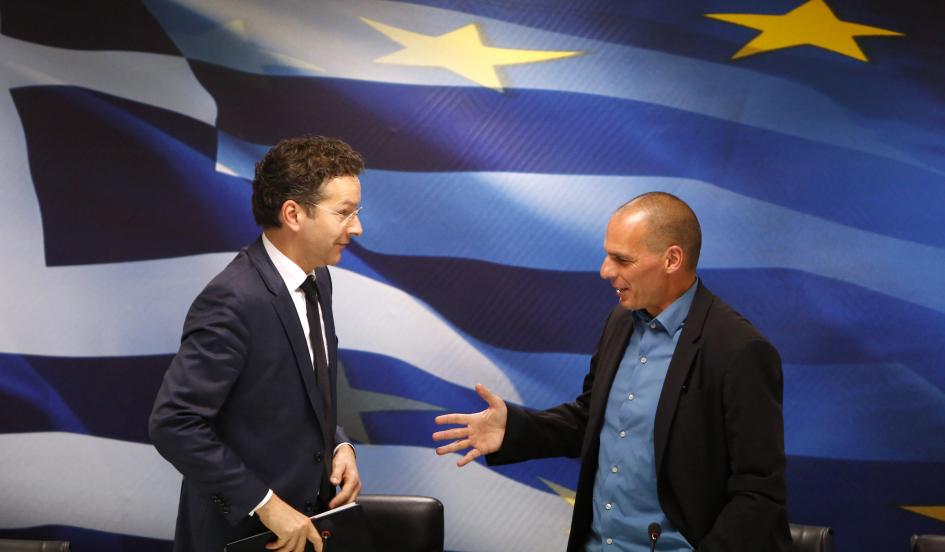Reuters
The new left-wing government in Athens opened negotiations on its bailout package with European partners on Friday by flatly rejecting the expected extension of the program and the international inspectors overseeing it.
Finance Minister Yanis Varoufakis met Jeroen Dijsselbloem, head of the euro zone finance ministers’ group, in Athens for what both described as “constructive” discussions on the new government’s aims.
But the hour-long meeting appeared to do nothing to bridge the gap between Prime Minister Alexis Tsipras’ government and European partners who have insisted that Greece must respect its obligations under the 240-billion-euro bailout.
The meeting with Dijsselbloem was the first in a series for Varoufakis, who travels to London,Paris and Rome next week as the government looks to build support.
Tsipras, who makes his first foreign visit as prime minister to Cyprus on Monday, will also be inRome on Tuesday for meetings with Italian Prime Minister Matteo Renzi, one of the leading voices in Europe against strict budget austerity.
But he said Greece had no intention of cooperating with a mission from the “troika” of European and International Monetary Fund lenders and would not be seeking an extension to a Feb. 28 deadline with euro zone lenders.
“This platform enabled us to win the confidence of the Greek people,” he told reporters after the meeting. “Our first action as a government will not be to reject the rationale of questioning this program through a request to extend it.”
Dijsselbloem said a decision on the deadline would be reached before the end of February but rejected Greece’s push for a special conference on debt, saying a conference already existed in the form of the Eurogroup of euro zone finance ministers.
Varoufakis gave no indication of what Greece, which must be under a EU/IMF bailout program to ensure its banks have continued access to ECB funding, would do if it cannot reach an agreement by the deadline.
Athens is waiting on a final bailout tranche of 7.2 billion euros ($8.13 billion) and has been shut out of international bond markets faces but faces around 10 billion euros in debt repayments this summer.
German Finance Minister Wolfgang Schaeuble repeated a message hammered home by Berlinsince the new Greek government’s arrival, saying German generosity had already been stretched to its limit and that it could not accept blackmail.
Tsipras’ government has taken office showing it has no intention of softening its opposition to the bailout program, halting privatizations, reinstating hundreds of laid-off public sector workers and increasing low-income pensions.
Varoufakis said he had assured Dijsselbloem that Athens planned to implement reforms to make the economy more competitive and have balanced budgets but that it would not accept a “self-fed crisis” of deflation and non-viable debt.
In turn, Dijsselbloem said he had told the new government to respect the terms of the existing agreement between Greece and the euro zone and warned against taking unilateral steps, saying it was important not to reverse progress made so far.
He said euro zone partners were ready to continue supporting Greece until it can begin borrowing on the markets again “provided that Greece fully complies with the requirements and objectives of the program”.









